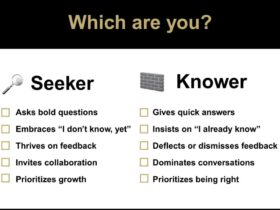Are you struggling with common personal brand mistakes? Is your brand failing to gain traction despite your efforts? Not sure why personal branding is important? Building a personal brand requires more than just posting content—it requires strategy, consistency, and avoiding key pitfalls. This blog highlights 21 mistakes that people often make when trying to stand out, including relying too much on viral content, ignoring key platforms, and focusing too much on perfection. Learn how to avoid these personal brand strategy errors, such as letting others control your narrative, underestimating the power of video, or relying solely on AI for your content. If you’re serious about building your personal brand, this guide is essential for making sure your efforts lead to real success.
Some people I run into think, “If you post it, they will follow!” They imagine that with a few “viral” posts or a video or two, their brand will take off, and everyone will know and love them!
I particularly love branding and PR gurus and coaches who will sell you a simple course that will “make you famous in 30 days.” I wish you could do one or two things: maybe perfect your “brand statement,” and your personal brand would take off, and a million important people would want to interview and learn from you.
Unfortunately, this is not anywhere near the reality of modern-day thought leadership or social media. The truth is lots of people make mistakes when trying to build a powerful personal brand. Many of these mistakes can be avoided outright. Others might take a little finesse or, in some cases, therapy, but if you look at these common personal branding mistakes, I think you’ll recognize the ones holding you back or the ones you can avoid outright.
Table of Contents:
21 Common Mistakes People Make When Building a Powerful Personal Brand
- Letting Others Control or Kill Your Personal Brand
- Focusing Too Much on Brand Statements
- Ignoring the Gatekeepers Between You and Your Audience
- Expecting Instant Success
- Perfection Paralysis
- Pretending to Be an Expert
- Being Overly Sensitive
- Underestimating the Power of Video
- Relying on AI to Build Your Brand
- Telling Instead of Listening
- Poor Design Choices
- Relying on Past Accomplishments
- Relying on a Single Platform
- Ignoring Your ROI
- Underestimating Google’s Algorithm
- Missing Key Asset: Your Website
- Failing to Engage on Social Media
- Ignoring Data and Analytics
- Using Your Brand to Sell, Not Help
- Not Defining Your Target Market
- Chasing Trends
21 Common Mistakes People Make When Building a Powerful Personal Brand
Building a personal brand is critical to standing out in today’s competitive world. However, many people fall into traps that prevent them from achieving their desired visibility and authority, limiting growth and visibility. Below are 21 of the most common mistakes we see and how to avoid them.
1. Letting Others Control or Kill Your Personal Brand
Whether you like it or not, you already have a personal brand. With just a few keystrokes, anyone can search for your name and learn about you—or worse, learn nothing at all. One of the most significant mistakes people make is allowing others to control their narrative.
For example, if you’ve been featured on podcasts, interviews, or public speaking engagements, all that content resides outside your control unless you actively promote it yourself. By taking ownership, you ensure that the right stories are being told.
Additionally, never let someone else dictate when or if you should build your personal brand. I often see this dynamic in companies with co-founders. One founder recognizes the importance of establishing their brand to enhance credibility. At the same time, the other resists out of fear or competition. This resistance is counterproductive—your personal brand is an asset to both you and your company.
2. Focusing Too Much on Brand Statements
Many people obsess over crafting the perfect brand statement, thinking it will magically build their brand. While a brand statement is important, it’s just a 30-second elevator pitch. The real work lies in consistently building your brand through actions, content, and engagement.
3. Ignoring the Gatekeepers Between You and Your Audience
You can’t ignore the algorithms that control what your audience sees. On social media, not everyone who follows you will see your posts. In fact, studies show that as little as 6% of your audience may be exposed to your content organically. Understanding how each platform works and tailoring your content to trigger those algorithms is critical for expanding your reach.
One of the initial key metrics for you to pay close attention to is your social media reach. The more reach you have, the more people can follow you and start building your audience momentum.
4. Expecting Instant Success
Brand building takes time. I often hear people say, “I want to be just like Mel Robbins or Gary Vee,” but they don’t understand that those individuals didn’t reach the top overnight. It took them years of consistent effort to build their brands. Don’t expect instant results—commit to the process.
5. Perfection Paralysis
Many people delay launching their personal brand because they feel everything must be perfect first. Here’s the truth: your brand will evolve over time, and waiting for perfection will only delay your progress.
6. Pretending to Be an Expert
Positioning yourself as an expert in an area where you have no real experience is a recipe for failure. Your audience can tell when you’re not authentic. It’s far better to showcase your genuine expertise and build from there than to pretend to be something you’re not.
7. Being Overly Sensitive
Social media can be brutal, and some people will always have something negative to say. If you’re too sensitive or overly concerned with how you look to others, you may be tempted to over-edit your photos or present an inauthentic version of yourself. Authenticity is key; the occasional critic is just part of the territory.
If some Internet troll wants to say something nasty about your hair or clothes––or anything for that matter––just realize that it comes from a place of jealousy. They either don’t have the determination or wherewithal to build their brand, so they want to cut you down to prevent you from getting ahead. You’ve got to learn to let it go.
I’ve had clients who completely implode and self-sabotage their personal brands and PR just because someone said something disparaging. Sometimes, it’s their friends that can be the most hurtful. But again, this is due to jealousy and nothing more. Don’t give up on your brand!
8. Underestimating the Power of Video
Video is the quickest way for people to know, like, and trust you. People want to see and hear you answer their questions or share insights. If you’re not leveraging video content, you’re missing a major opportunity to build a connection with your audience.
9. Relying on AI to Build Your Brand
While AI can help with content creation, relying solely on AI-generated material can damage your brand’s authenticity. Algorithms are already detecting AI-generated content and downgrading it. Your audience values authenticity, and that’s something AI can’t replicate.
10. Telling Instead of Listening
Building a personal brand isn’t just about telling people what you want them to know. You also need to listen to your audience’s questions and pain points. By addressing their needs, you’ll earn their engagement and loyalty. If you’re only broadcasting, you’re missing valuable feedback and opportunities to grow and evolve with your audience’s needs.
11. Poor Design Choices
Your brand’s visual presentation is crucial. Inconsistent design elements or a lack of visual appeal can make your brand look unprofessional. People are visual creatures, and a well-designed brand fosters trust and recognition.
12. Relying on Past Accomplishments
As Janet Jackson said, “What have you done for me lately?” Past accomplishments are great, but your audience is more interested in what you’re doing right now. Don’t rely solely on outdated achievements—stay relevant and continue delivering value.
13. Relying on a Single Platform
Your audience likely spans multiple platforms, and so should you. Algorithms change, platforms evolve, and social networks rise and fall. Don’t put all your eggs in one basket. Diversify your online presence so that you can reach people wherever they spend their time.
14. Ignoring Your ROI
Your personal brand is an investment; like any investment, you should track its return. Whether it’s increased engagement, new clients, or monetization opportunities, pay attention to how your brand impacts your bottom line.
15. Underestimating Google’s Algorithm
Underestimating the power that Google has over the content you create is a sure recipe for disaster. Google has its own algorithms that determine if content is displayed or not. Outwardly, they promote the idea that they are protecting people from unscrupulous individuals putting out false information. That may or may not be accurate, but the fact is Google can decide to squash all your hard-earned efforts to build your brand.
The two major algorithms that impact you are the YMYL and the EAT. Both of these are designed to protect people by only letting individuals with the proper credentials be able to speak to topics loosely included under “Your Money or Your Life” or, to go a step further, “Expertise, Authority, and Trustworthiness.”
So, if you write about health, wealth, or happiness, Google’s YMYL (Your Money or Your Life) guidelines will subject your content to stricter scrutiny. Google will look for credentials and authority to verify the information you provide.
So, how do you demonstrate you have the proper credentials? Without a personal website or proof of your expertise, your content may be downgraded or even hidden.
16. Missing Key Asset: Your Website
A personal website is your fortress online. It’s the one place where you have complete control over your brand, free from the constraints of social media algorithms. If you don’t have your own website, you’re missing out on a critical element of your personal branding strategy.
17. Failing to Engage on Social Media
Posting content isn’t enough. You must engage directly with your audience. Respond to comments, ask questions, and foster conversations. Engagement builds community, and community builds loyalty. Make sure you do it in a timely manner to build trust and rapport. People will quickly lose interest if you’re hard to reach or connect with.
18. Ignoring Data and Analytics
Many people fail to use data to inform their personal branding efforts. Analytics on social media, website performance, and content engagement can provide valuable insights into what works and what doesn’t. Without this information, you’re making blind guesses. Regularly reviewing your performance metrics allows you to refine your strategy and focus on the most effective tactics.
19. Using Your Brand to Sell, Not Help
The most successful personal brands focus on helping their audience, not just selling to them. People don’t want to be constantly bombarded with sales pitches—they want valuable insights and assistance. By offering help first, sales will naturally follow.
20. Not Defining Your Target Market
Without understanding your target audience, you’re flying blind. Research who they are, their challenges, and how you can offer solutions. Knowing your audience is the foundation of any successful personal brand. Don’t try to appeal to everyone, either. If your focus is too broad, your message runs the risk of becoming diluted and less impactful. The best personal brands are laser-focused on their niche, where their messaging is specific, relatable, and engaging.
21. Chasing Trends
It’s tempting to follow every trend or hashtag that’s popular at the moment, but doing so can make your brand feel scattered and unfocused. While staying current and relevant is important, you should only engage with trends that align with your brand’s mission, values, and audience. Chasing trends for the sake of visibility can erode your authenticity and make your brand seem disingenuous.
Conclusion
Building a personal brand requires dedication, authenticity, and strategic planning. It’s a process that evolves over time and involves far more than posting content and hoping for viral success. Avoiding these common mistakes can help you build a personal brand that resonates with your audience, establishes your authority, and drives long-term success.
Perhaps the most important takeaway is that your personal brand is a reflection of you—your values, experiences, and expertise. Authenticity should always be at the core of your strategy. The more genuine you are, the more likely people will resonate with your message and engage with your content. And remember, building a personal brand is a marathon, not a sprint. Be patient, stay consistent, and focus on creating meaningful connections with your audience. If you do this, you’ll find that your brand doesn’t just grow—it thrives.
In today’s fast-paced digital world, your personal brand can be the key to opening doors of opportunity and establishing yourself as a thought leader. With the right strategy and mindset, you’ll not only build a brand that gets attention but one that lasts.














